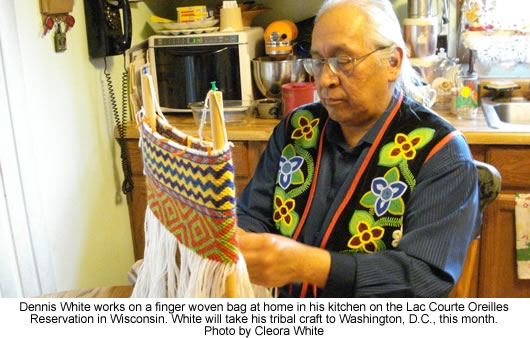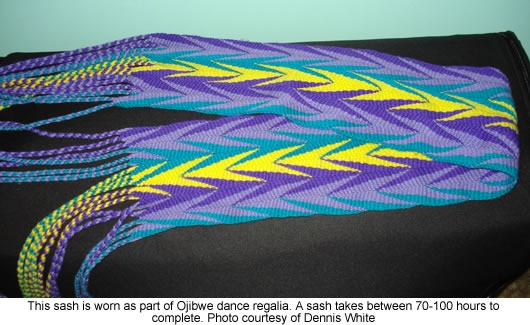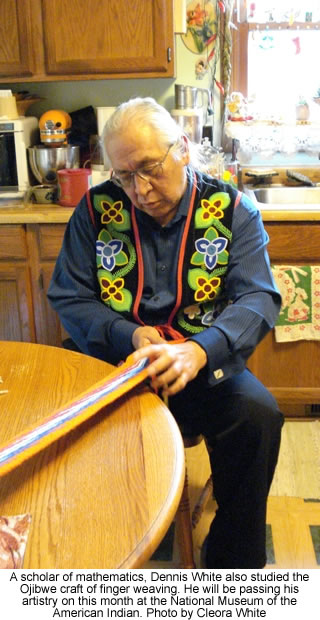 |
Canku Ota
|
 |
|
(Many Paths)
|
||
|
An Online Newsletter
Celebrating Native America
|
||
|
May 1, 2010 - Volume
8 Number 5
|
||
|
|
||
|
Fancy Sky Goes To
Washington
|
||
|
by Mary Annette Pember
- The Daily Yonder
|
||
|
A
master craftsman, weaving mathematics and Ojibwe tradition, winds
up with an artist's residency in Washington.
He is lost in what he describes as an addiction, finger weaving. The essence of simplicity, the ancient art of finger weaving requires only fibers, a stick on which to anchor the fibers, and fingers. Its deceptive simplicity, however, requires a deep understanding of mathematics. According to Mezinaanakwad, finger weaving offers a perfect example of the Fundamental Theorem of Arithmetic, which states that, any integer greater than 1 can be expressed as a unique product…(I apologize, readers, that I must stop here in any further discussion of mathematical theory. I can already feel my pulse and breathing rate increasing as I approach the dreaded, inexplicable and embarrassing fear zone of math. )
I recently learned that Dennis will be sharing his love of finger weaving with the public in Washington D.C., at the National Museum of the American Indian. He was chosen as one of four people in the U. S. for the Museum’s Artist Leadership Program. The program recognizes and supports indigenous community artists and while preserving traditional art and culture. As a participant, Dennis will study and consult with NMAI experts and explore the museum’s collection of finger weavings. During the two-week residency he will conduct research and make a public presentation about the craft on December 12 at 1 pm in the museum’s Resource Center.
Born and raised on the LCO rez, Dennis is currently administrator for the LCO Ojibwe K-12 school. I met him and his wife Cleora, my godmother, in the early 1980s when he was pursuing his doctorate -- in mathematics, of course -- at the University of Wisconsin-Madison. He was just beginning his love affair with finger weaving. Mostly, self-taught, Dennis initially learned from books. Later, he found a few remaining elders who still practiced the craft to guide him. I recall watching him teach his daughters math with the help of finger weaving and wondering at the remarkable sophistication of the Ojibwe ancestors who initiated this craft. Like so many traditional Ojibwe activities, weaving integrates myriad life lessons while creating usable objects. It underscores the wisdom of indigenous knowledge and its relevance in a contemporary world. Finger weaving allows Dennis to express his deep love of Ojibwe language and culture, and tribal spirituality as well. Elders have described for him how finger woven bags were used in ancient traditional Ojibwe ceremonies. As I think of the expression on his face when he weaves, Dennis appears to be at ceremony, deep in prayer yet present and in touch with the gods of math. |
|
|
||
|
|
||
| Canku Ota is a free Newsletter celebrating Native America, its traditions and accomplishments . We do not provide subscriber or visitor names to anyone. Some articles presented in Canku Ota may contain copyright material. We have received appropriate permissions for republishing any articles. Material appearing here is distributed without profit or monetary gain to those who have expressed an interest. This is in accordance with Title 17 U.S.C. Section 107. | ||
|
Canku Ota is a copyright ©
2000, 2001, 2002, 2003, 2004, 2005, 2006, 2007, 2008, 2009, 2010
of Vicki Barry and Paul Barry.
|
||
 |
 |
|
|
The "Canku
Ota - A Newsletter Celebrating Native America" web site and
its design is the
|
||
|
Copyright ©
1999, 2000, 2001, 2002, 2003, 2004, 2005,
2006, 2007, 2008, 2009, 2010
of Paul C. Barry.
|
||
|
All Rights Reserved.
|
||
 When
I think of my godfather, Mezinaanakwad, Fancy Sky, I picture him
sitting calmly in his cozy rez kitchen early in the morning, sipping
coffee while listening to jazz. He seems the very picture of serenity
until I notice his hands buried in colorful strands of yarn, furiously
working the threads into fantastically intricate patterns for bags
and belts. Knowing him and his love for mathematics, I also imagine
I can just barely hear a million tiny perfectly synchronized gears
whirring away in his head.
When
I think of my godfather, Mezinaanakwad, Fancy Sky, I picture him
sitting calmly in his cozy rez kitchen early in the morning, sipping
coffee while listening to jazz. He seems the very picture of serenity
until I notice his hands buried in colorful strands of yarn, furiously
working the threads into fantastically intricate patterns for bags
and belts. Knowing him and his love for mathematics, I also imagine
I can just barely hear a million tiny perfectly synchronized gears
whirring away in his head. Mezinaanakwad,
whose English name is Dennis White, has a great love of all things
mathematical. He sees numbers everywhere and is endlessly fascinated
by the patterns in finger weaving as expressions of multiples and
symmetry.
Mezinaanakwad,
whose English name is Dennis White, has a great love of all things
mathematical. He sees numbers everywhere and is endlessly fascinated
by the patterns in finger weaving as expressions of multiples and
symmetry. The
Artist Leadership program will also support Fancy Sky’s efforts
to generate interest in the nearly extinct craft within his community
on the Lac Courte O’reilles Reservation in Wisconsin. Dennis
hopes to create a course in weaving at the LCO College and grow
a new generation of weavers. With the help of the NMAI program,
Dennis will work on consolidating his many notebooks of weaving
sketches and notes to create a book on the craft.
The
Artist Leadership program will also support Fancy Sky’s efforts
to generate interest in the nearly extinct craft within his community
on the Lac Courte O’reilles Reservation in Wisconsin. Dennis
hopes to create a course in weaving at the LCO College and grow
a new generation of weavers. With the help of the NMAI program,
Dennis will work on consolidating his many notebooks of weaving
sketches and notes to create a book on the craft.